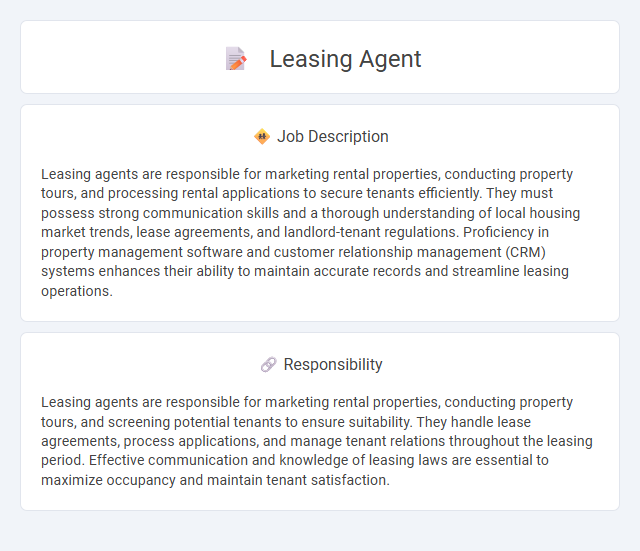
Leasing agents are responsible for marketing rental properties, conducting property tours, and processing rental applications to secure tenants efficiently. They must possess strong communication skills and a thorough understanding of local housing market trends, lease agreements, and landlord-tenant regulations. Proficiency in property management software and customer relationship management (CRM) systems enhances their ability to maintain accurate records and streamline leasing operations.
Individuals who possess strong interpersonal skills and a proactive attitude will likely find success as leasing agents, as the role often involves frequent communication and problem-solving. Those who can handle high-pressure situations and demonstrate patience may be better suited for the job's demands, which include managing tenant inquiries and negotiating lease agreements. Conversely, people who struggle with customer interaction or prefer routine, solitary tasks may find the leasing agent position less compatible with their strengths.
Qualification
Leasing agents must possess strong communication skills and a solid understanding of property management principles to effectively attract and screen potential tenants. Relevant qualifications often include a high school diploma or equivalent, with many employers preferring candidates who hold certifications in real estate or leasing management. Experience with contract negotiation, tenant relations, and familiarity with local housing laws enhances a leasing agent's ability to maintain occupancy rates and ensure compliance.
Responsibility
Leasing agents are responsible for marketing rental properties, conducting property tours, and screening potential tenants to ensure suitability. They handle lease agreements, process applications, and manage tenant relations throughout the leasing period. Effective communication and knowledge of leasing laws are essential to maximize occupancy and maintain tenant satisfaction.
Benefit
Leasing agents likely enjoy benefits such as competitive commissions and bonuses tied to successful property rentals, providing financial motivation beyond a base salary. They may also have opportunities for career growth within property management companies, increasing job stability and earning potential. Access to flexible work schedules and networking within the real estate industry could further enhance their professional development and job satisfaction.
Challenge
A leasing agent job likely involves overcoming the challenge of matching diverse client needs with available properties in competitive markets. The role probably requires managing multiple inquiries simultaneously while maintaining clear and persuasive communication to secure leases efficiently. Navigating complex lease agreements and resolving tenant concerns could also present ongoing obstacles demanding strong problem-solving skills.
Career Advancement
Leasing agents play a crucial role in property management by marketing rental properties, screening applicants, and facilitating lease agreements. Career advancement opportunities often lead to positions such as property manager or real estate asset manager, where professionals oversee multiple properties and strategic operations. Gaining certifications like Certified Apartment Leasing Professional (CALP) can accelerate growth and improve job prospects in the real estate industry.
 kuljobs.com
kuljobs.com